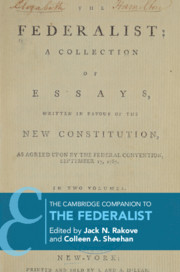Book contents
- The Cambridge Companion to The Federalist
- Other Volumes in the Series of Cambridge Companions to Philosophy
- The Cambridge Companion to The Federalist
- Copyright page
- Contents
- Contributors
- Acknowledgments
- Abbreviations
- Introduction
- 1 Publius and the Anti-Federalists:
- 2 John Jay, The Federalist, and the Constitution
- 3 “A Vigorous National Government”: Hamilton on Security, War, and Revenue
- 4 “The Known Opinion of the Impartial World”
- 5 The Federalist’s New Federalism
- 6 The Political Psychology of Publius
- 7 Montesquieu, Hume, Adam Smith, and the Philosophical Perspective of The Federalist
- 8 Madison’s Republican Remedy
- 9 The Republicanism of Publius
- 10 “The Interest of the Man”: James Madison’s Constitutional Politics
- 11 Politics Indoors and Out-of-Doors
- 12 “The Cool and Deliberate Sense of the Community”
- 13 Publius on Monarchy
- 14 The Genius of Hamilton and the Birth of the Modern Theory of the Judiciary
- 15 Publius’s Political Science
- 16 The Republican Form of Government in The Federalist
- Index
- Other Volumes in the Series of Cambridge Companions to Philosophy
11 - Politics Indoors and Out-of-Doors
A Fault Line in Madison’s Thinking
Published online by Cambridge University Press: 28 February 2020
- The Cambridge Companion to The Federalist
- Other Volumes in the Series of Cambridge Companions to Philosophy
- The Cambridge Companion to The Federalist
- Copyright page
- Contents
- Contributors
- Acknowledgments
- Abbreviations
- Introduction
- 1 Publius and the Anti-Federalists:
- 2 John Jay, The Federalist, and the Constitution
- 3 “A Vigorous National Government”: Hamilton on Security, War, and Revenue
- 4 “The Known Opinion of the Impartial World”
- 5 The Federalist’s New Federalism
- 6 The Political Psychology of Publius
- 7 Montesquieu, Hume, Adam Smith, and the Philosophical Perspective of The Federalist
- 8 Madison’s Republican Remedy
- 9 The Republicanism of Publius
- 10 “The Interest of the Man”: James Madison’s Constitutional Politics
- 11 Politics Indoors and Out-of-Doors
- 12 “The Cool and Deliberate Sense of the Community”
- 13 Publius on Monarchy
- 14 The Genius of Hamilton and the Birth of the Modern Theory of the Judiciary
- 15 Publius’s Political Science
- 16 The Republican Form of Government in The Federalist
- Index
- Other Volumes in the Series of Cambridge Companions to Philosophy
Summary
In the winter of 1791–92, James Madison compiled a set of reading notes that scholars long assumed were meant to support the “party press” essays he soon published in the National Gazette, the new Republican newspaper edited by his college friend, the poet Philip Freneau. But as Colleen Sheehan has argued, Madison also conceived these “Notes on Government” for a more ambitious project: to draft a treatise on republican government that would apply the lessons of the American experience to problems that had long fascinated political theorists. The table of contents that opens the notebook indicates the outlines of the argument. The treatise, alas, remained unwritten – a reminder of the fact that Madison preferred to do his best political writing for himself, rather than the reading public. Alexander Hamilton, his co-author as Publius, felt fewer inhibitions and proved a more spirited polemicist. Had Madison gone back to Virginia in the fall of 1787, to aid in the ratification struggle in his native state, rather than returning to the Continental Congress, his twenty-nine contributions to The Federalist would never have appeared. Without Federalist 10 and 51 and a few other essays to guide our thinking, the modern concept of a “Madisonian constitution” might never have formed. Who knows: had Hamilton written nearly all of The Federalist, with a little assistance from John Jay, we might have been stuck with a “Hamiltonian constitution” all along.
- Type
- Chapter
- Information
- The Cambridge Companion to The Federalist , pp. 370 - 399Publisher: Cambridge University PressPrint publication year: 2020

